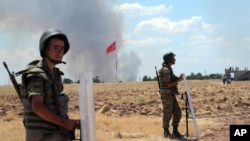Turkey has warned it will retaliate if it feels its security is threatened by either Islamic extremists or Syrian Kurds along its border, but it appears for now Ankara is not contemplating a broader go-it-alone intervention to establish a buffer zone inside Syria as some Turkish press reports suggested.
After a meeting of senior officials Monday, Turkey’s top security body expressed its concerns about “demographic changes” underway in war-torn northern Syria favoring Kurds over Arabs, and also about possible terror attacks by Islamic extremists. But the statement offered no indication that Turkey is about to mount a broad unilateral military intervention to carve out a buffer zone.
Some opposition politicians accused the Islamist government, which lost its parliamentary majority in elections this month, of stoking war fever to strengthen its hand in coalition negotiations or to improve its standing in a possible re-run election, if no coalition government can be formed.
Opposing a Kurdish state
For several days there has been intense speculation that President Recep Tayyip Erdogan is planning a military intervention in northern Syria, mainly to prevent Syrian Kurds from forming their own state. The dominant Syrian Kurdish party, the Democratic Union Party, or PYD, is an offshoot of Turkey’s outlawed Kurdistan Workers’ Party, the PKK, which has battled Ankara for three-decades for self-rule. Turkey considers the PYD a terrorist organization.
Last week, following significant battlefield gains over the Islamic extremists by Kurdish-led forces, including the capture from Islamic State militants of the Arab border town of Tal Abayad, Erdogan vowed Turkey would never accept a Kurdish state. “I am saying this to the whole world: We will never allow the establishment of a state on our southern border in the north of Syria,” he said. “We will continue our fight in that respect, whatever the cost may be.”
For days, pro-government newspapers have reported a military intervention is in the offing, saying the goal would be to establish a buffer zone 100 kilometers long and 30 kilometers deep using 18,000 soldiers. Opposition politicians warned an intervention was hours away. On Thursday and Friday, VOA traveled along much of the Turkish side of border from Akcakale to Karkamis, but could see no signs of a military buildup of the scale that would be needed to mount an intervention.
In its statement Monday, the country’s national security council said: “The developments taking place in our southern neighbor, Syria, have been assessed in detail and additional measures taken along our border have been reviewed. Concerns over terror acts targeting the civilians in the region, as well as attempts for demographic change have been voiced.”
Counteracting speculation
Shortly before the council met, Turkey’s prime minister, Ahmet Davutoglu, also appeared eager to counteract speculation about Turkish intervention in Syria.
”If we ever reach a conclusion that Turkey's borders are under any threat, our country is ready for any contingency and it has done everything necessary for that readiness.” Davutoglu said in Istanbul.
Turkey has long urged Washington and other partners in the U.S.-led anti-IS coalition to establish a no-fly-zone and safe haven in northern Syria. Turkish leaders have argued a buffer zone could be used to shelter war refugees on Syrian soil, making it unnecessary for them to cross into Turkey for sanctuary. Turkey is hosting up to two million Syrian refugees, by some estimates, and the government says the refugees have cost Turkey about $6 billion.
But the Kurdish advances in northern Syria have alarmed the government the most in recent weeks, often more than the danger of IS. Last week, Kurdish officials accused Ankara of allowing Islamic extremists to cross the border from Turkey to mount a surprise assault on the Syrian Kurdish border town of Kobani. Turkish officials vehemently deny the allegation.
In capturing Tal Abayad from Islamic State militants last week, Kurdish forces connected two pieces of territory they have long controlled in northern Syria along the Turkish border. Turkish officials claim the Syrian Kurds are eager to engineer a demographic change along the border in their favor.
The leader of one of Turkey’s main opposition parties, the Republican People’s Party (CHP), Kemal Kilicdaroglu, accused President Erdogan and his ruling Justice and Development Party (AKP) on Tuesday of “turning foreign policy into an element of domestic politics.”
He says he still fears the AKP is considering an intervention. He said “I am warning them not to drag Turkey into an adventure; it would have a high cost. And the people on the street, not the politicians, would foot such a bill,” he said in an interview with Turkey Hurriyet newspaper.
On Monday, U.S. State Department spokesman Mark Toner said Washington has no “solid evidence” any of Syria’s neighbors are considering trying to establish buffer zones in Syria. He said there would be "serious logistical challenges" in trying to establish such zones.









